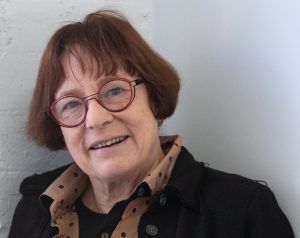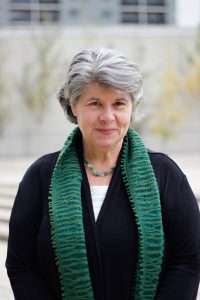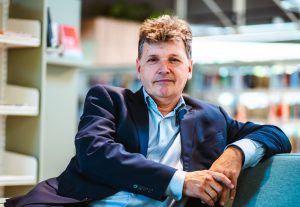2024 Research Symposium

EVENT LOCATION
University Library
Singel 425, Amsterdam
Doelenzaal
Access to trustworthy and reliable information is essential in a civil society. In a world with many different and powerful stakeholders shaping the information landscape, the ease with which anyone can produce, use, and circulate data leads to the unresolved question of how authoritative information could possibly be distinguished from information sludge. This question is becoming increasingly pressing for institutions that operate in the public interest. Datafication of society and the use of ever-changing digital applications create complex and dynamic technological environments. As a consequence, institutions have great difficulty in processing and managing data and information in a way that allows them to comply with the rule of law. Traditional information and records management concepts and practices have been largely overtaken by the rapid technological and societal changes.
Recordkeeping informatics is a framework developed by researchers at Monash University, Australia that takes these complexities and associated power dynamics as its starting point. Recordkeeping informatics aims to provide organisations with guidance in processing and managing data and information effectively and efficiently in order to be able to perform domain-specific tasks, but also to ensure accountability and evidence for the short and the long term. In this symposium, we pay specific attention to the question of what it takes to transform information management into an inclusive and sustainable practice, that is, a set of values and attitudes which is shared by organisational agents and citizens, and can be upheld over time. Recordkeeping informatics offers a new paradigm that can be used to answer such a question.
The overarching objective of this working symposium is to initiate and motivate cross-disciplinary participation in recordkeeping informatics research and practice. In-person participants will have the opportunity to discuss and investigate the usability and applicability of this framework for recordkeeping practices and to formulate a research agenda relevant to scholars and practitioners.
This working symposium is of interest to anyone working in information management-related fields, including records managers, information officers, archivists, ICT experts, data and computer scientists, as well as students, educators, and researchers who are intrigued by the continuously evolving, networked nature of organisations, information processes, and information objects.
Although online attendance (with limited access to the program) is possible, in-person participation is strongly encouraged. Four invited experts will contribute their specialist and unique insight into the discussion: Barbara Reed, Laura Millar, Martin Berendse and Periklis Andritsos.
Organisers: Professor Charles Jeurgens, University of Amsterdam; Professor Gillian Oliver, Monash University; Associate Professor Fiorella Foscarini, University of Toronto; Associate Professor Ragna Kemp Haraldsdottir, University of Iceland
Supported by I-Partnerschap of the Dutch Ministry of the Interior and Kingdom Relations
Presenters

Barbara Reed has consulted in the records, archives and information industries for over 25
years to clients in private industry, all tiers of government and non profit organisations, both
in Australia and overseas, particularly in the Asia Pacific region. Recognised as a records
continuum advocate and practitioner, special areas of interest include digital recordkeeping
strategies, recordkeeping metadata and standards development for whole of government
initiatives. Barbara has had a long involvement in the development of Australian and International
Standards for recordkeeping. She has acted as an advisor to a number of projects which
have included the NSW Government’s ICT Advisory Board and its Enabling Information
Sharing Working Group, MoReq 2010 and is a founding member of The Recordkeeping
Roundtable. Recent projects include conceptual design for digital archives and digital preservation in a state archival institution, developing government wide digital preservation strategies and implementation for whole of government in Hong Kong, and designing information governance, information management and recordkeeping policy and programmes for big corporates. Previously a Senior Lecturer at Monash University, she has taught archives and records to post graduate students at Curtin University, University of Canberra and University of NSW. Recent research engagement is with projects on recordkeeping rights and supporting work on Indigenous data sovereignty. Barbara has published widely in archives, records and information management journals both locally and nationally. She is a Fellow of both the Australian Society of Archivists and the Records and Information Management Professionals Australasia.

Laura Millar has worked as a records, archives, and information management consultant and scholar for nearly 40 years, advising on records and archives programmes for governments and organizations around the world. Laura received her Master of Archival Studies degree from the University of British Columbia, Canada, in 1984 and her PhD in Archives from the University of London, England, in 1996. She taught for many years in the fields of records and archives management and is the author of dozens of publications and presentations. Her archival textbook Archives: Principles and Practices (2010, rev. ed 2017) was awarded the Society of American Archivists’ Waldo Gifford Leland Award in 2011. Her most recent book A Matter of Facts: The Value of Evidence in an Information Age (2019) aims to raise public awareness of fundamental importance of evidence, including archives, to society. Laura has been recognized as a Fellow of the Association of Canadian Archivists and as an Honorary Senior Research Associate at University College London. In 2021 she received the Emmett Leahy Award for contributions to information and records management, and in 2022 she was made a Fellow of the International Council on Archives.

Periklis Andritsos is an Associate Professor at the Faculty of Information of the University of Toronto. He has taught both in Canada (University of Toronto) and in European Institutions (Italy and Switzerland). He holds a Masters and PhD from the Department of Computer Science at the University of Toronto in Canada, where he also stayed for post-doctoral studies. In his research, he deals with the management and extraction of knowledge from large data sources and more specifically with the clustering of categorical (non-numerical) data. His research work with the LIMBO algorithm is a benchmark in this research area with its use to extract useful information for database redesign. He is a co-founder of two start-up companies, Thoora Inc. and Odaia.ai. The first has received the TechCrunch 50 award as one of the best emerging companies of 2009 worldwide and is the owner of 4 patents. In recent years, he has been dealing with the application of deep learning and Process Mining technologies to data referred to as Customer Journey Maps, which provides information on the user experience when a service is consumed. His work in this field has been recognized as the first to deal with the subject and has been distinguished with two best paper awards at international conferences. The techniques proposed in them have been used both in the company Odaia.ai and in bank applications (National Bank of Denmark) and in urban transport information systems (Municipality of Lausanne, Switzerland).

Martin Berendse. After a decade (1987-1997) in marketing and performing arts management, another decade (1998-2007) in cultural policy and civil service (Ministry of Education, Culture and Science, The Hague), Martin Berendse entered the world of information management, FOI, open data and international cooperation as national archivist of The Netherlands. He was elected president of the International Council on Archives in 2010. In 2014 Martin was appointed CEO of the Amsterdam Public Library network, OBA™, with almost 4M visitors/year, 150K members and 26 branches one of the biggest social, educational and cultural hubs of Amsterdam. Since 2022 Martin is vice chair of ACOI, the Dutch Advisory Board on Public Access and Information Management (Adviescollege Openbaarheid en Informatiehuishouding).
This new Advisory Board has been established with the Dutch Open Government Act of 2021 (Wet open overheid), and advises government and parliament about open government policy, information management and the implementation of open government legislation. It also plays a mediating role for professionals like journalists and researchers/scientists with complaints about the authorities’ decisions taken in response to their open government requests. Finally ACOI promotes the application of the Open Government Act, for instance by providing information, training, monitoring and publishing guidelines on disclosure and access.
